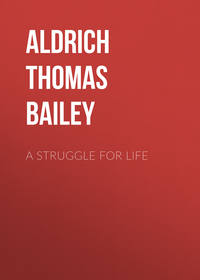Kitobni o'qish: «A Struggle For Life»
One morning as I was passing through Boston Common, which lies between my home and my office, I met a gentleman lounging along The Mall. I am generally preoccupied when walking, and often thread my way through crowded streets without distinctly observing any one. But this man’s face forced itself upon me, and a singular face it was. His eyes were faded, and his hair, which he wore long, was flecked with gray. His hair and eyes, if I may say so, were sixty years old, the rest of him not thirty. The youthfulness of his figure, the elasticity of his gait, and the venerable appearance of his head were incongruities that drew more than one pair of curious eyes towards him, He excited in me the painful suspicion that he had got either somebody else’s head or somebody else’s body. He was evidently an American, at least so far as the upper part of him was concerned—the New England cut of countenance is unmistakable—evidently a man who had seen something of the world, but strangely young and old.
Before reaching the Park Street gate, I had taken up the thread of thought which he had unconsciously broken; yet throughout the day this old young man, with his unwrinkled brow and silvered locks, glided in like a phantom between me and my duties.
The next morning I again encountered him on The Mall. He was resting lazily on the green rails, watching two little sloops in distress, which two ragged ship-owners had consigned to the mimic perils of the Pond. The vessels lay becalmed in the middle of the ocean, displaying a tantalizing lack of sympathy with the frantic helplessness of the owners on shore. As the gentleman observed their dilemma, a light came into his faded eyes, then died out leaving them drearier than before. I wondered if he, too, in his time, had sent out ships that drifted and drifted and never came to port; and if these poor toys were to him types of his own losses.
“That man has a story, and I should like to know it,” I said, half aloud, halting in one of those winding paths which branch off from the pastoral quietness of the Pond, and end in the rush and tumult of Tremont Street.
“Would you?” exclaimed a voice at my side. I turned and faced Mr. H–, a neighbor of mine, who laughed heartily at finding me talking to myself. “Well,” he added, reflectingly, “I can tell you this man’s story; and if you will match the narrative with anything as curious, I shall be glad to hear it.”
“You know him, then?”
“Yes and no. That is to say, I do not know him personally; but I know a singular passage in his life. I happened to be in Paris when he was buried.”
“Buried!”
“Well, strictly speaking, not buried; but something quite like it. If you ‘ve a spare half hour,” continued my friend H–, “we ‘ll sit on this bench, and I will tell you all I know of an affair that made some noise in Paris a couple of years ago. The gentleman himself, standing yonder, will serve as a sort of frontispiece to the romance—a full-page illustration, as it were.”
The following pages contain the story Which Mr. H– related to me. While he was telling it, a gentle wind arose; the miniature sloops drifted feebly about the ocean; the wretched owners flew from point to point, as the deceptive breeze promised to waft the barks to either shore; the early robins trilled now and then from the newly fringed elms; and the old young man leaned on the rail in the sunshine, little dreaming that two gossips were discussing his affairs within twenty yards of him.
Three persons were sitting in a salon whose one large window overlooked the Place Vendôme. M. Dorine, with his back half turned on the other two occupants of the apartment, was reading the Journal des Débats in an alcove, pausing from time to time to wipe his glasses, and taking scrupulous pains not to glance towards the lounge at his right, on which were seated Mile. Dorine and a young American gentleman, whose handsome face rather frankly told his position in the family. There was not a happier man in Paris that afternoon than Philip Wentworth. Life had become so delicious to him that he shrunk from looking beyond to-day. What could the future add to his full heart, what might it not take away? The deepest joy has always something of melancholy in it—a presentiment, a fleeting sadness, a feeling without a name. Wentworth was conscious of this subtile shadow that night, when he rose from the lounge and thoughtfully held Julie’s hand to his lip for a moment before parting. A careless observer would not have thought him, as he was, the happiest man in Paris.
